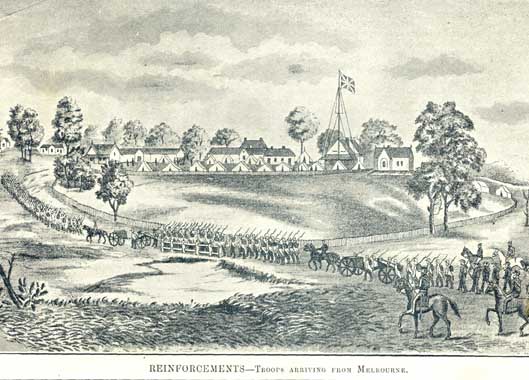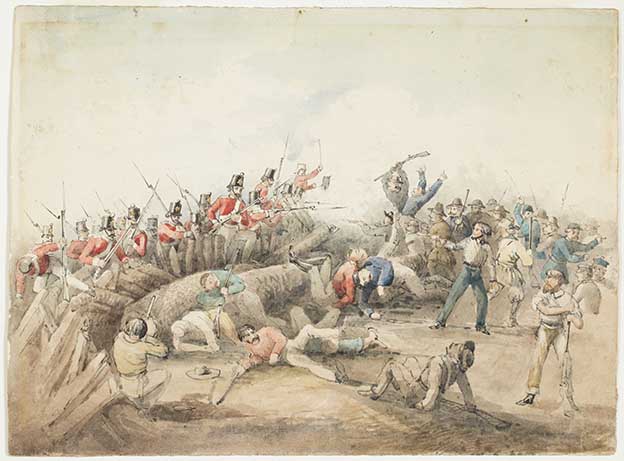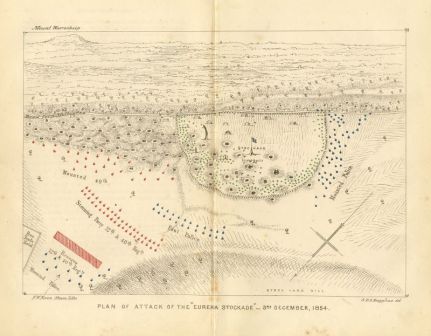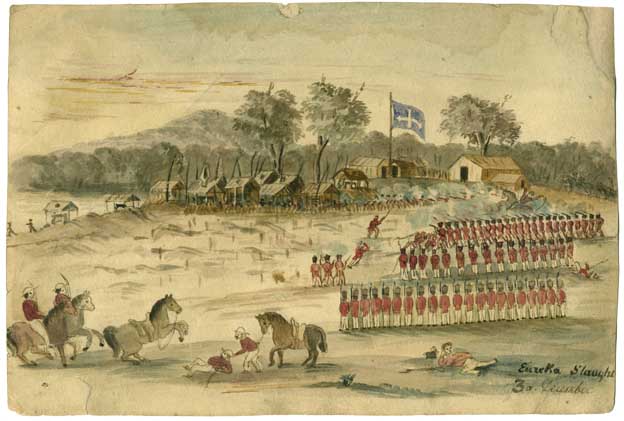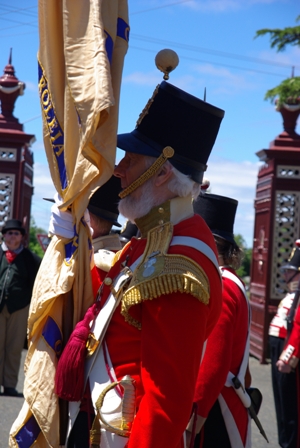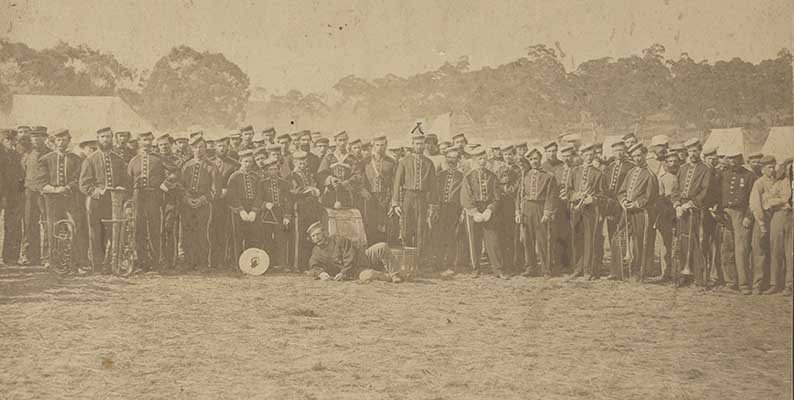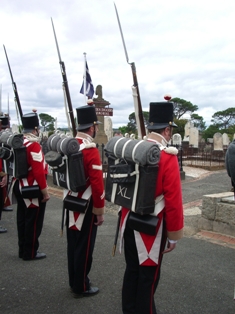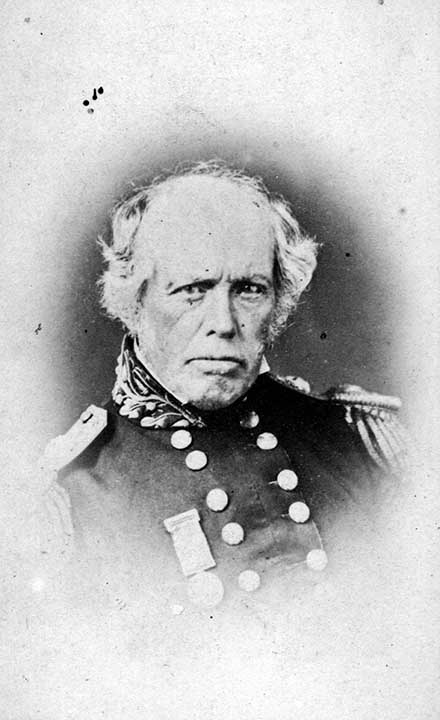Military
Contents
Background
Two regiments of the British Army were involved in the Eureka Stockade. They were the 12th Regiment and the 40th Regiment.[1]
The soldiers camped in a paddock close to Mrs Flack's home then known as the Werribee Hunt Hotel, Ballan. [2]
Military reinforcements from the 12th and 40th Regiments were sent to Ballarat arriving on 28 November 1854. The 40th Regiment marched into Ballarat led by Captain Henry Wise, with a full show of force and with bayonets drawn. In comparison to what occurred later that day they encountered no resistance or problems.[3]
- The shouting and hooting of the people intimated that something unusual had taken place, and accordingly in a few minutes afterwards was seen a detachment of the 40th Regiment marching towards the camp with fixed bayonets, and the officers with drawn swords. [4]
A detachment of the 12th Regiment entered Ballarat on 28 November 1854 between nine and ten o’clock at night, and marched through the Eureka Diggings accompanied by some transport waggons. An incident ensued which resulted in injuries to the Drummer Boy, John Egan; the publican, Benden Hassell; and the carter, George Young. [5]
After the Eureka Stockade battle three days of martial law ensued. Sixteen hundred soldiers and police were sent to Ballarat, with most leaving when quiet returned to the goldfield. [6]
The Pay and Muster Rolls for the 12th Regiment can be found on microfilm rolls at the Mitchell Library, NSW, the State Library of Victoria and the National Library, Canberra. These are part of the Australian Joint Copying Project (AJCP). They were microfilmed from the records of the War Office (W.O.) in Britain. This particular series is derived from W.O. 12. and covers the Adjutants Roll, Detachments, Reserve of the 12th Regiment Suffolk Battalion 1. From the Muster for October, November and December 1854 it would appear that the Regiment was considerably divided. While no officer or man is actually shown as stationed at Ballarat in December some are shown there on the Muster Rolls for November 1854, so that one can assume they were in Ballarat and took part in the Eureka Affair.
The reel numbers are 3714 to 3732. Reel 3714 has some details of the 11th Regiment on it as well. For the 12th Regiment it covers:
April 1854 - June 1854 (Belfast and Cork);
July 1854 to September 1854 (Cork and at Sea);
October 1854 to November 1854 (At Sea);
October 1854 to March 1855 (Victoria).
Some of the first references to NSW and Victoria are on Reel 3715:
April 1854 - March 1855 (Cape of Good Hope)(Reserves)
June 1854 - August 1854 (Victoria)(Detachment)
August 1854 to September 1854 and 1856 (Detachment in Victoria and NSW);
October 1854 to October 1854 (Detachment NSW).
July 1854 - March 1855 (Chatham)(Adjutant Roll)
Reel 3716 Volume 2972 - 1
April 1855 - December 1855 (Victoria)
December 1855 - December 1855 (At Sea)
January 1856 - March 1856 (Tasmania)
April 1855 - March 1855 (Cape of Good Hope)(Reserves)
November 1855 - March 1856 (South A.)(Detachment)
April 1855 - March 1856 (Chatham)(Adjutant Roll)[7]
The last references to NSW are on reel 3730: April 1866 to September 1866 (detachment NSW); October 1866 to November 1866 (NSW and New Zealand detachments). Reel 2994 covers April 1867 to June 1867 (New Zealand and At Sea); July 1867 to August 1867 (Devonport and Gosport).
The reels as a whole cover the wide range of movements while the unit was in Australia and New Zealand. They take some time to access and some are quite difficult to read. Half way through the alphabetical list of Reel 3714 is the list of the 12th Regiment in Ballarat in 1854. [8]
For more information on the 12th Regiment see Suffolk Regimental Museum, The Keep, Gibraltar Barracks, Out Risbygate Street, Bury St Edmunds, suffolk, IP33 3RN, UK.
40th Somersetshire Regiment of Foot The 40th Regiment were involved at the Eureka Stockade on 3 December 1854. The details of soldiers names has been taken from the Muster of December 1854. Most of the men were stationed at Geelong during the months previously of October, November and December 1854 when the Regiment was generally quartered in Melbourne. [9]
The Reel Numbers AJCP for the 40th Regiment are as follows:
April 1853 - March 1854 (Waterford) Reel 3775
April 1854 - March 1855 Reel 3776
April 1854 - March 1855 (Galway, Limerick) Reel 3777
After Eureka some of the 40th Regiment were posted to New Zealand.
1854
26 November 1854
DRAFT OF LETTER FROM THE GOVERNMENT OFFICES
Government Offices November 26th /54
Sir, I am directed by His Excellency the Lieutenant Governor to ? you that from information which he has received he is aware of a recent ??? existing at Ballaarat the strength and objects of which it is important to ascertain – you are therefore authorized to expend the sum of £100 (one Hundred Pounds) in the investigation of the matter. I am also to inform you thus you letter of the 25th November to the Chief Commissioner of Gold Fields has been laid before His Excellency and that he does not ?? it ? ??? at present any further enforcement at Ballaarat being of opinion that when you ? the Police in your vicinity, which you are to do, that you will have sufficient force to hold your own position. His Excellency further desires that you lay in, if possible, a fortnights provision for ? You will also take ??? constantly informed as to the transactions ? Ballarat, and you many rely on having? Company of Military in 36 hours after ? letter is dispatched. I need scarcely point out the ? of unnecessarily moving the ? you will therefore consider well before you ? A request of His Excellency. The Lientenant Governor desires ? to express his appreciation of this resolution to ? your position which you ?, and he ? with confidence on the judgement and ? of his Officers, who may equally rely upon ? for efficient ? A letter to the same ? matter to you yesterday – but as it is ? [10]
30 November 1854
Draft of letter to the Chief Commissioner of the Gold Fields
Colonial Secretary's Office Melbourne 30th November 1854
Sir, I have received instructions from the Lieutenant Governor, to express to you the great satisfaction Her Excellency feels with the conduct of the Civil Officers and the Forces under their command during the recent transactions at Ballarat . The conduct of the Military will of course be commended upon by the Resident Commissioner Ballarat. The Major General Commanding. I am further directed again to impress upon you, that it is your duty, as Resident Commissioner, to enforce all existing Laws, at the same time, it is Her Excellency’s desire that in doing so, you be careful to act calmly, firmly, and temperately- I have the honor to be Sir Your most obedient Servant Chas Hotham [11]
30 November 1854
From the Correspondent of the Geelong Advertiser.
Nov. 30th. - Most happily yesterday passed over quietly. The meeting was held, and the subjoined resolutions were passed unanimously.
About mid-day a platform was erected, and the Australian flag, and it only, hoisted to attract attention. Messrs. Black, Kennedy, and Humffray arrived by the conveyances from Geelong immediately before the hour of meeting. After their arrival some time, proceedings began. Mr. T. Hayes having been voted into the chair, the deputation to town was called on to state how matters stood there.
It was stated that the hands of His Excellency are so bound that he is comparatively powerless in so far as the extension of the franchise to the diggers, the more perfect unlocking of the lands, and the release of the prisoners, when demanded by the diggers.
Strong hopes, however, are entertained by the deputation that if a memorial be presented the prisoners will be immediately released. The appointment of a liberally-constituted commission is considered to be an event of importance, as the instructions of the commission are to rectify all that is wrong, as far as there is power vested in them or Sir Charles.
The principal speakers were Reynolds, Weeks, Salor, Brady, Vern, Quin, G. Black, Wheatley, Murnane, Ross, Humffray, Kennedy, etc.
Right Rev. Bishop Goold, and Rev. Mr. Downing, came from Melbourne yesterday. So urgent did they consider their business that, I understand, they had travelled all the night previous. After their arrival, Rev. Mr. Downing, and the Rev. Mr. Smith tried to persuade both the committee and the meeting to give up the intended burning of the licenses, but without avail. The amendment to resolution three had scarcely a favourer. If I understand a right, this deputation came up at the instigation of the Government, which wished them to use their influence and prevent the hurrying on the crisis which nears, now that the licenses are burned. The number of licenses already burned is pretty large; the next license hunting day is the one on which all eyes are at present centred.
During the earlier portion of the meeting, and for some time, the military under arms were posted in the gully beneath the camp, and all the other force was under arms in the camp. The Rev. Mr. Smith and Mr. Kennedy went over, at the request of the committee, and wished the military to be withdrawn from the sight of the meeting, as there was no real use for the display, and that many felt irritated at such an open parade of power.
The meeting passed off quietly; there was a large number of persons fully armed, who kept up a running fire of small arms. The meeting dispersed with only a slight accident to a horse from a pistol ball.
A large body of police was marched up yesterday evening to the Camp, on Eureka, to watch it, as the night before there had been a complete rush made on it by the diggers there, and some violence committed.
We have, I believe - (for I can not obtain correct official information), six soldiers and police in the hospital, some badly wounded, from the effects of Monday evening and night's row. This does not include Capt. Young, who was contractor for the conveyance of supplies from town, and who was so cruelly used as to render his life in imminent danger. In addition to all this sad list, must be added one soldier of the 12th, who has died of a gun shot wound.
Many others, both officers and men, are seriously hurt, though not in the hospital. I have heard several versions of the origin of this quarrel. By tomorrow I hope to know the real state of the matter. This morning gives promises of proving a brick fielder; the dust is flying in all directions, under the influence of a strong hot wind.
In a second edition of the Geelong Advertiser, published at eleven o'clock yesterday, a letter of later date appears. The Ballaarat correspondence of our contemporary indicates somewhat of an animus which requires his description of the aspect of events to be read with some allowance. Perhaps it is impossible for one whose feelings are enlisted in behalf of one party in such a conflict to divert himself entirely of partisanship in recording its progress; and probably, no one who is at present on Ballaarat, could avoid, to some extent, identifying himself with one party or the other:-
Ballaarat, Two o'clock, November 30. 'Tis only ten hours since I closed my regular correspondence, but the events which have since transpired are so extraordinary as to demand an express, which I hope will arrive in time for tomorrow's issue.
About eleven today, a body of police, horse and foot, left the Camp, under the command of Mr. Commissioner Johnstone. When they had moored the Eagle Saloon, on the New Road, the people began to "Joe" them; the party so calling were surrounded and asked for their licenses. Some had them, some had not. Those who had none bolted off and ran among the Gravel Pit holes. This fact was soon communicated to the Camp. Mr. Commissioner Rede and more force soon arrived. This gentleman got among the crowd and remonstrated with them; he said that unless they separated, he would read the Riot Act, which he soon after attempted to do, but did not read through. By this time the whole force of the Camp was out on the Flat, or on the slope leading to the township; some four or five prisoners were taken and marched off, whether for resistance or want of licenses, I know not. One man who was in charge, attempted to escape, he ran among the tents on the Flat, and both police and military were ordered by an inspector of police to fire on him, which they did. This happened among tents where women and children were congregated in large numbers. I do not hear of any deaths on either side, though some are wounded. About twelve o'clock the force was withdrawn, and as I write all is again quiet. From where I am writing, I see the soldiers under arms outside the camp. The police are all under arms in the camp, and the mess-room verandah is breast-worked with bags filled with earth and sand. Work is knocked off, and the whole population is talking over the events of the morning.
The Resident Commissioner rode up to Mr. Humffray, the Secretary of the League, and some others, and said, "See now the consequences of your agitation;" to which it was replied, "No, but see the consequences of impolitic coercion." I wish that our local authorities had but a little common sense. Was it right, was it politic to go on a license- hunting raid in such terms and under such exciting circumstances? Mr. Humffray personally warned the Lieutenant-Governor in town, and I have called his attention to the necessity of being prepared to act with judgment under the circumstances.
The Express waits - I must conclude by saying that rain has come on after the morning's hot winds.
2 December 1854
NEWSPAPER REPORT The Argus
RIOT AT BALLAARAT - MOVEMENTS OF THE MILITARY
From the statement made in the Legislative Council yesterday by the Colonial Secretary, it will be seen that a collision had taken place between the rioters and the military, although happily without loss of life on either side. The state of things on the diggings has indeed become most critical, and any hour may bring us intelligence of the most serious nature. The Government is thoroughly aroused, and is concentrating the whole military and police force of the colony at Ballaarat. All the available men of the 40th and 12th regiments have left town for that locality. A body of 300 rank and file of the former regiment, with their band, were marched out yesterday afternoon under the command of Lieutenant-Colonel Valliant, and the whole of the officers of the regiment. They took with them four field- pieces, two six and two twelve pounders. All the officers and the men of the 12th regiment, with the exception of Captain Vereker, and the necessary guard, have left for the same place. They number about three hundred. Twenty four men-of-war's men and about twenty marines from H.M. ship Electra have also been sent off. Fifty horse and about the same number of foot police were to be despatched yesterday afternoon. A large number of baggage and ammunition waggons were sent with the military. We also hear that Sir Robert Nickle, Commander-in-chief of the Forces, and Colonel Macartney, Adjutant-General, intended to start for Ballaarat at three o'clock this morning. The amount of the force, military and police, to be assembled at these diggings will be little short of a thousand men.
5 December 1854
5th December I am commanded by the L.G to inform you that he has perused your Despatch dated Decr 3 1854 to the C.C. of the gold fields. Since the period when H.E. deemed it necessary to strengthen the Military detachment up to the present moment His Ex has had every reason to be satisfied with the conduct of the officers of men belonging to the Ballaarat goldfield. H.E. considers that you exercise ? and wise discretion in attacking the insurgents instead of waiting until they were the aggressors, for ???? the prestige which ? attaches itself to the force who obliges its opportunity ? in upholding Law and order deems it his duty to call the particular attention of all the authorities to the exercise of moderation and forbearance for as it was incumbent upon him and them to support the Law, so will the public voice ? be heard according to the mode in which the ? proceedings are conducted. No man is to be hard pressed for the license fee at a moment when perhaps the recent disorders have ? completed his view – no harsh words are to used, or recrimination thought of. H.E firmly relies that the officers will continue to merit his good opinion as well as that of the people of the Colony. This letter is of course to be communicated to the Major Gen. Cor? [12]
12th Regiment
The 12th (East Suffolk) Regiment
Robert Samuel Adair, B.T. Adams, William Adams, William Alderton, Edward Archer, George Arden, Arthur Atkinson, William Atwell, Frederick Austin, Joseph Barden, John Barrow, James Berry, John Birch, John Hill Birch, William Bird, James Bourne, Felix Boyle, Bartholomew Bradley, William Bragg, Benjamin Broker, George Brown, George Bryant, William Butwell, Charles Campbell, Samuel Carter, Andrew Canty, Timothy Canty, Joseph Carrigan, Samuel Carter, John Casserly, Charles Chamberlain, Jonas Collins, Thomas Cole, William Colvin, Richard Coombs, Robert Cornish, John Cresswell, John Cridge, Haymen Crude, Thomas Culpeck, Martin Daley, William Davidson, Samuel Davis, Thomas Dawson, Thomas Denny, John Donegan, John Donohue, John Donolly, James Dow, John Doward, Peter Dowd, Thomas Downs, John Drury, John Duke, Frederick Dutton, William Earl, John Egan, Adam Ferguson, John Finn, Patrick Flynn, Daniel Flynn, Joseph Forsyth, William French, George Fuller, Timothy Galvin, Alfred Geates, Henry Goddard, Edmund Grace, Robert Grant, Robert Griffin, Bryan Grimstone, William Grimwood, William Haddon, Henry Hall, William Hall, George Harding, John Hare, Richard Hargreaves, David Hawthorne, George Hayman, John Hearn, Thomas Hogan, Patrick Hynott, John Hurstwaite, Thomas Husband, James Huxley, William Hustable, Finniess Ing, James Jeffrey, William Jewell, William Johnstone, Robert Jones, Francis Keefe, Thomas Keen, John Kempt, John Knights, John Lackey, William Lang, William Lawrence, John Leekey, James Leonard, George Littlehales, William Lumber, Joseph Lyness, John Marskand, John Manning, William Martin, John McArdle, John McArthur, Edward McCormish, Thomas McDermott, John McGarry, Peter McGorrigle, Patrick McGrath, Edmund Medgley, John Melton, Jacob Moore, Michael Moran, Alfred Murrey, Jeremiah Newell, Richard Norgrove, James Nowlan, Patrick O'Donnell, John Reynolds Palmer Samuel Parker, John Parkhouse, James Parry, Henry Perry, William Paul, Henry Payne, Rogers, William Percy, Michael Pinder, Simon Pritzler, William Queade, William Quinn, John Reed, Robert Reid, James Reilly, Samuel Reynolds, William Revel, John Sargeant, Garret Shanahan, James Sharkey, Edward Sharpe, George Sharpe, John Shovlin, Thomas Smith, John Smith, Jesse Spalding, James Stowe, John Sullivan, William Sutcliffe, George Swatman, John Thomas, Henry Thompson, John Thompson, Henry Timmons, William Turner, Daniel Vaughan, William Underwood, James Wagstaff, Andrew Walker, George Warner, John Waters, Robert Watson, William Webb, George Wend, William Wilkinson, H.L. Williams, Wise, George Wood, James Wright, Charles Yalden, Richard Young
40th Regiment
The 40th (2nd Somersetshire Regiment) arrived in Victoria from England in October 1852 at the request of Governor Charles LaTrobe.
Adams, Arthur Atkinson, Thomas Bass, Josiah Bigsby, Thomas Bodely, George Bowdler, Thomas Breadley, Denis Brien, Patrick Butler, John Broadhurst, James Brown, Thomas Bruce-Gardyne, John Bryan, Patrick Burke, Patrick Butler, George Byford, John Byrne, John Cameron, John Campbell, Samuel Clampet, William Cliff, Edwin Coles, Henry Collis, William Cork, Henry Cottes, John J. Crow, Martin Cusack, George Davis, Patrick Dwyer, Henry Fisher, Thomas Fitzgerald, William French, Thomas Frost, William Gardener, Thomas Gardyne, Michael Gay, James Glancy, James Gore, Daniel Hagerty, Israel Hales, Charles Hall, Edward Harris, James Harris, John Harvey, Daniel Hegarty, James Hill, George Howdler, Alfred Hurlestone, R.C. Hutchings, Joseph Jubb, William Juniper, John Keeble, James Kelly, Lawrence Kelly, Hugh King, John Knowles, Charles Ladbrook, Francis Langham, Frederick Langham, John Langham, James Louge, Patrick Lynot[13], William MacCarron, John Mallagh, William Manella, Private John Manning, Michael McAdam, Peter McCabe, Justin MacCarthy, John McEvoy, Henry McDermott, Thomas McDermott, John McGurk, Samuel McKee, John Macoboy, William Manella, Michael McAdam[14], Charles Meacham, Charles Miner, William Mole, Arthur Mollers, Michael Moran, Lot Mullen, Michael Murphy, William Murrell, Charles Must, John Neill, Thomas Nelson, Mark Noble, Michael O'Connel, Edward O'Dell, Bernard O'Donnell, Patrick O'Keefe, Henry Patchett, William Pearce, William Prayle, Joseph Rayner, Thomas Reed, Bailey Richards, Patrick Reilly, William Revel, Bailey Richards, Thomas Richards, William Richardson, Edward Riley, Michael Roney, John Ryan, John Sharland, Patrick Sinnott, William Smith, Cornelius Sorrell, James Stowe, Patrick Sullivan, William Swan, John Thomas, James Turner, Thomas Valiant, Joseph Wall, Patrick Walsh, William Webb, Cornelius Whelan, Henry Wise, Hans White, John White. [15]
G H Mann said in his memoirs that he was a soldier stationed at Ballarat. He described the storming of the Eureka Stockade as similar to the storming of the barricades in Paris. '40th Regiment storm the barricades'.[16] G H Mann was not on the listing in Sabretache nor in the Pay and Muster Lists. However, they are notoriously difficult to research, and his name may have been omitted. His memoirs can be found at the State Library of Victoria, MS 9288.
Officers and men of this Regiment who were present at the Eureka Stockade action in December 1854 also served in New Zealand and were entitled to a medal. Only three names appear on the effective list giving dates of service. All others are on the Non-effective list which does not state the dates they were in New Zealand.
Mr John O'Neill said that the commander of the 40th regiment commissioned him to carry the baggage of some 14 soldiers to Ballarat. They were on their way to the Eureka Stockade riots. He received 10 pounds for each soldier's baggage.

"Sacred to the memory of Henry Christopher Wise Esq, captain in H.M. 40th 2nd Somerset Regiment. Eldest son of Henry Christopher and Harriett Wise of Woodcote, who died on the 21st of December 1854 at Mt Ballarat, Victoria, South Australia, or wounds received on the third of the same month, while gallantly leading his company to the assembly of the rebel stockade at Eureka, Ballarat. This tablet is erected by the officers of the 40th Regiment."
In The News
- THE AFFAIR AT BALLARAT.
- By the courtesy of Colonel Macarthur, Deputy Adjutant-General, we have been favoured with the following official account of the rencontre of the military with the diggers at Ballaarat, on the 3rd instant :
- General Order.- No. 163. Head Quarters, Camp, Ballaarat, December 9, 1854.
- The Major-General has had under consideration the report of Captain Thomas, 40th Regiment, respecting a sharp rencontre which took place at dawn, on the 3rd instant, about one mile and half from this Camp, between a body of insurgents and part of the troops then at Ballaarat.
- The party in this affair was composed of one subaltern, and 65 of other ranks of a detachment of the 12th Regiment, under Captain Queade ; one subaltern, and 30 of other ranks of the military mounted force, under Lieutenant Hall, 40th Regiment; and one subaltern, and 87 of other ranks of a detachment 40th Regiment, under Captain Wise; together with six officers and 94 mounted and foot constabulary. Captain Pasley, the Royal Engineers. Lieutenant Richards, 40th Regiment, and Sub-lnspector Taylor, were Captain Thomas's orderly officers on this occasion.
- The force thus constituted, advanced steadily until they received the fire of the rebels, and then stormed an extensive barricade which these had for same days constructed, and held as a strong-hold.
- In their headlong flight before the vigorous assault of the troops, they met with severe and merited chastisement. Thirty are believed to have been killed, and a much larger number wounded.
- This salutary lesson to the traitors and anarchists, then banded together for the subversion of law and order has, the Major-General regrets to learn, not been effected without Captain Wise, 40th Regiment, Lieutenant Paull, 12th Regiment, being severely wounded, and the casualties contained in the subjoined list.
- Sir Robert Nickle will not fail to submit the names of the killed and wounded for the consideration of the Right Honourable the General commanding in chief, in order to their being transmitted to their respective parishes, so that friend and kinsmen may become acquainted with their gallantry.
- While here with the troops, the remembrance of these brave men will be kept alive in the sections of which they form a part. Like them, whether in splendid triumphs or in minor affairs, it is the good opinion of the officers, non commissioned officers, and pivaies to which he belongs, that every true soldier should ,seek to obtain. The Major-General considers that Captain Thomas deserved the utmost praise for the secrecy which he maintained while planning this energetic attack, as well as for the promptitude with which it was accomplished when planned.
- On an occasion when all are reported to have behaved well, both soldiery and police, it would be invidious to made distinctions ; but this much may be affirmed, that, while the troops dealt heavy blows on the insurgents, they were not unmindful of the protection of their wounded officers on the field.
- List of casualties incurred by the force under the command of Captain J. W. Thomas, 40th Regiment, in the attack on the rebel, camp at Eureka, on the 3rd December, 1854 : -
- 12th Regiment.
- Lieutenant W. H. Paull, severely wounded.
- Private William Webb, mortally ditto, since dead.
- Private Robert Adair, severely wounded.
- Private John Smith, severely ditto.
- Private Felix Boyle, severely ditto.
- Private William Buttwill, very severely ditto.
- Private Timothy Galvin, severely ditto.
- Private William French, severely ditto.
- 40th Regiment.
- Private Michael Rooney, killed.
- Captain H. C. Wise, dangerously wounded.
- Private John Bryan, severely ditto
- Private Henry Cottes, slightly wounded.
- Private William Juniper, severely ditto.
- Private Bernard O'Donnell, severely ditto,
- Private Joseph Wall, mortally, since dead.
- Private Patrick Sullivan, slightly wounded.
- By command,
- (Signed)
- E. MACARTHUR, D.A.G.[17]
- EUREKA STOCKADE VETERAN DIES. SOLDIERS' SYMPATHY WITH MINERS.
- Martin Cusack, who was the last of the 40th Regiment that was engaged in 1854 in the fight with this early diggers of the Eureka Stockade, died in the Ballarat Benevolent Asylum last week. In the attack on the stockade in the early morning the 40th Regiment was assisted by two companies of the 12th Regiment, which was on service in Australia, while both bodies received the support of a number of naval men lying in Hobson's Bay, Cusack, who was 85 years of age, was of opinion that the revolt was a great mistake, and was not justified. Cusack, in conversation with a representative of the "Age" some days ago, said:... "We of the 40th Regiment marched against our will. The Ballarat diggers, we knew, were our own kith and kin, and we felt it would be a poor hour of day if we were ordered to fire at them. Many of us prayed during our march through the bush that the men of the Eureka would see that there could possibly be no hope for them in a battle with well-trained Imperial soldiers, such as the 12th and 40th Regiments. Their brush with us was a forlorn hope, and we all wished to avoid meeting them. We quietly agreed among ourselves that if we had to shoot we would fire high as I have said, were our own kith and in order to frighten the diggers who, kin from England, Ireland, Scotland, and America. Just as we were marching on Ballarat, however, a thing occurred that greatly exasperated the soldiers. We were marching in fous near the Red Hill, when a digger (a colored man) stepped out of his tent, and picking up a quartz boulder he threw it at our flank, killing our little drummer boy. When the poor little fellow collapsed and rolled over his drum, we all swore we would revenge his death by showing no quarter in fair battle. The veteran, who enlisted in the 40th Regiment in Ireland in 1850, had been confined to his bed in the Benevolent Asylum for seventeen years.[18]
- A relic of the encounter that took pince at the Eureka Stockade on December 3, 1854, between British soldiers and Ballarat gold diggers was (says the "Age" of March I) on Saturday discovered by a fossicker in the vicinity of the stockade. It is in the shape of a military scabbard. 3ft. in length. The relic, which has been badly affected by rust, having 'been embedded in the earth for some 54 years, belonged apparently to an officer of the 40th regiment, which, with the 12th regiment and a party of men of war from a ship then lying in Hobson's Bay, was engaged in the work of storming the stockade. It is curved and weighs about 2lb Melbourne antiquarian is desirous of purchasing the scabbard which is on view at a shop in the Main-Road. Mr. C. C. Shoppee. superintendent of the Ballarat Benevolent Asylum, has in his possession an Insurgent's pistol, found in an old hole inside the stockade many years subsequent to the armed revolt of the diggers. Some time ago a wealthy pioneer offered £10 for this old-fashioned pistol.' [19]
Commemoration
- British recall Eureka. Ballarat, Thursday
- Eureka centenary celebration greetings were received in Ballarat to-day from two English regiments whose men were involved in the Eureka Stockade. One was a cablegram from Brigadier Backhouse, Colonel of the Suffolk Regiment. Sent to the 8-7th infantry battalion at Ballarat, it read:
- "On the occasion of the 100th anniversary of the action at Ballarat, all ranks Suffolk Regiment send their greetings and best wishes. "They remember the 12th Foot and the Australians who died."
- A similar message came from the South Lancashire Regiment.
- The "South Lanes" was the 40th Foot which was en-gaged in the affair at Eureka.
- The regiment also sent £5 for two wreaths.[20]
Also See
References
- ↑ VPRS 1189, Unit 140 J54/12.375 Monthly Returns and Distribution of Troops, Brigade Office Melbourne 1 November 1854; 1853/C12301 Office of Ordnance Pall Mall 7 November 1853 Returns of the 40th Regiments 1 October 1853 et al; J54/12.182 Ammunition amounts in Powder Magazine, October 1854 with a list of cannons etc; K54/11.693 Both Regiments are ready at one hours notice to march to Ballarat.
- ↑ The Bacchus Marsh Express, 30 November 1946
- ↑ Wickham, D., Gervasoni, C. & Phillipson, W., Eureka Research Directory, Ballarat Heritage Services, 1999.
- ↑ From Tent To Parliament, Berry Anderson & Co., Ballarat, p12.
- ↑ Wickham, D., Gervasoni, C. & Phillipson, W., Eureka Research Directory, Ballarat Heritage Services, 1999.
- ↑ Train, George F., A Yankee Merchant in Goldrush Australia, William Heinemann Australia Pty Ltd, 1970, p166.
- ↑ Notes: Dorothy Wickham, 1996
- ↑ PRO 3776 (1-139), Volume 5365
- ↑ 12/5366
- ↑ VPRS 1189/P, Unit 30, Item K54
- ↑ PROV, VPRS 1189/P, Unit 30, File K54
- ↑ VPRS 1189/P, Unit 30, Item K54
- ↑ Email from J. Fawcett to C. Gervasoni, 28 November 2004.
- ↑ Email from J. Fawcett to C. Gervasoni, 28 November 2004.
- ↑ Sabretache, July 1968
- ↑ Clare Wright, The Next Throb of Outraged Humanity: Australia in a Revolutionary Age, In David Headon and John Uhr (editors), Eureka Australia’s Greatest Story, The Federation Press, p. 45; SLV MS 9288
- ↑ Sydney Morning Herald, 19 December 1854.
- ↑ Townsville Daily Bulletin, 29 October 1912.
- ↑ Barrier Miner, 6 March 1909.
- ↑ The Argus, 03 December 1954.
External Links
http://www.eurekapedia.org/index.php?title=Special:CiteThisPage&page=Military&id=18336
http://www.lancashireinfantrymuseum.org.uk/the-battle-of-the-eureka-stockade/
